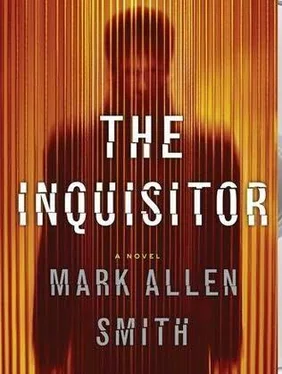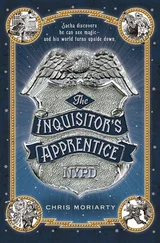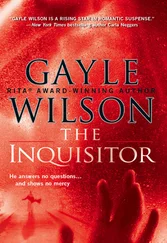Mark Smith - The Inquisitor
Здесь есть возможность читать онлайн «Mark Smith - The Inquisitor» весь текст электронной книги совершенно бесплатно (целиком полную версию без сокращений). В некоторых случаях можно слушать аудио, скачать через торрент в формате fb2 и присутствует краткое содержание. Жанр: Триллер, на английском языке. Описание произведения, (предисловие) а так же отзывы посетителей доступны на портале библиотеки ЛибКат.
- Название:The Inquisitor
- Автор:
- Жанр:
- Год:неизвестен
- ISBN:нет данных
- Рейтинг книги:5 / 5. Голосов: 1
-
Избранное:Добавить в избранное
- Отзывы:
-
Ваша оценка:
- 100
- 1
- 2
- 3
- 4
- 5
The Inquisitor: краткое содержание, описание и аннотация
Предлагаем к чтению аннотацию, описание, краткое содержание или предисловие (зависит от того, что написал сам автор книги «The Inquisitor»). Если вы не нашли необходимую информацию о книге — напишите в комментариях, мы постараемся отыскать её.
The Inquisitor — читать онлайн бесплатно полную книгу (весь текст) целиком
Ниже представлен текст книги, разбитый по страницам. Система сохранения места последней прочитанной страницы, позволяет с удобством читать онлайн бесплатно книгу «The Inquisitor», без необходимости каждый раз заново искать на чём Вы остановились. Поставьте закладку, и сможете в любой момент перейти на страницу, на которой закончили чтение.
Интервал:
Закладка:
When Corley first heard about the migraines, he wrote a prescription for Imitrex, but Geiger declined to accept it. He didn’t take pills for his pain; in his mind, that would be attacking it from the outside. He dealt with pain from the inside, and like most of the mundane processes in his daily life, his method was uncomplicated and ritualistic.
When a migraine moved in, Geiger would put on some music, always rich and textured, and curl up on the floor of the closet. He would close the door, strap on the Sennheisers, and give himself to the blackness and sound. Then he would reach down deep and wrap his arms around the pain, and when it became all he felt, the only thing he felt, he became as strong as the pain. And that’s when he would grab the pain by its throat and kill it.
Lodged in some crevice of his brain was the knowledge that there was more than one way to deal with pain. Geiger had spent much of his life traveling this road-as beast, as rider-and what few understood about pain was its dual potential. It could be used not only by the inflictor but by the receiver, and as a primal sensation it could be tapped as a source of strength. The more intense the pain, the stronger its power-he knew this. He also understood, somehow, that pain had made him who he was.
7
“I had the dream again,” said Geiger, his fingers tapping at the couch.
Corley scribbled Increasd freq of dream on his pad. The dream was a treasure map teeming with details; it was also a potential ingress to the inner self. Except for scattered, random images, Geiger had no memory of his life before he came to New York, but it was in the retelling of the dream and its variations that shadows of past catastrophes peeked into the light for Corley to see. The dreams were maelstroms of ambivalence in which Geiger’s critical need to act battled his desperate need not to. The opposing urges created such a furious storm within Geiger that, in the dream, it literally pulled him apart. In his notes, Corley had dubbed it the “Endgame” dream, and though he still didn’t fully understand it, he had become certain of one of its meanings: as a child, Geiger had desperately sought to escape from some kind of intolerable scenario, but doing so had brought on psychological disintegration, or at least the death of that part of him capable of rejoicing in his freedom.
“It’s coming more often now-the dream,” said Corley. “Three in the last five weeks.”
“Four,” said Geiger.
Corley felt a slight, queasy shift in his chest. “Four? The station wagon, the bike, the motorcycle…”
“And the skateboard.”
Corley squelched a mutter, and put pen to pad.
“I can hear the pen, Martin. What’re you writing?”
“That I forgot one of your dreams. How do you feel about that?” Corley asked.
“Meaning what? Do I see you as less imperfect than anyone else?”
“Well, I think there’s a certain reliance on the patient’s part that I’ll remember what is talked about in this room. It goes to trust.”
“Trust,” Geiger repeated. “Do you trust me, Martin?”
The quintessential Geiger tone-smooth as a mirror, devoid of affect-forcing the listener to deconstruct the statement to try to discover the attitude within it or the intent behind it. Do you trust me, Martin? Do you trust me, Martin? Do you trust me, Martin?
Corley put his pad on the carpet and settled back in his chair. “Tell me about the dream,” he said.
Geiger’s fingers came to rest, his hands on his stomach. “I’m running in a dark tunnel-old, wooden beams like an abandoned mine. There’s a light ahead of me.”
“You’re ten, eleven?”
“Yes. I hear the roar of a cave-in behind me. It sounds alive, like an angry beast. I burst into the light as the entrance collapses-and I’ve got that sense of purpose, even though I don’t know where I’m going. Then I’m on a sidewalk-in New Orleans, I think-but I can’t cross the street because a funeral procession is going by, hundreds of people clapping and shouting, ‘Hallelujah!’ while a band is playing Dixieland music. The coffin comes by, small and black, on a cart pulled by four toy horses.”
“You mean Shetland ponies?”
“No, toy horses-wooden hobbyhorses on wheels. Beautifully crafted. I have to get across the street, so I hurdle the coffin, but my feet clip it, and as I sprawl to the ground the coffin tips over and this boy rolls out. My age, blue suit, polished shoes. He doesn’t look like me, but I know immediately that it is me. The dead me looks so peaceful that I just want to lie there with him, but the need to get where I’m going is stronger, so I get up and run.”
Corley picked up his pad again and wrote, Mourning for who-or what?
“Soon I get to a river and there’s a motorboat at a dock. I grab the starter cord and pull and pull. The motor turns over but won’t catch. As always, my overalls are full of tools and I pull a wrench out to unscrew the engine’s hood. I’m turning the bolts but the wrench won’t grab hold, and then my fingers start falling off, followed by my feet and legs. My head starts to come loose… and then I wake up.”
Corley made another note. “You said the cave-in sounded ‘like an angry beast.’ What’s it angry about?”
“I guess it’s angry about being buried in the cave-in.”
“All right. Could it be angry about anything else?”
“Like what?”
“Maybe it’s angry at you.”
“Why?”
“Because you were getting out of the cave.”
“So-maybe I’m not just running out of the cave, I’m running away from the beast?”
A now-familiar heat ignited Corley’s insides, the urge to soothe and comfort, to protect the little boy always trapped somewhere-in a burning building, a dark room with a knobless door, now a cave. He chafed at the nearly absurd therapeutic truth: that to free the child, he had to unlock his torment and have him live through it all over again.
Corley knew time was almost up, but he didn’t want to stop.
“One thing that always strikes me about the dream is the absence of fear. You never talk about the past, but you must have experienced fear. In the dream, you go through harrowing events, but never feel afraid. You ever wonder why?”
“Because there’s no longer anything to be scared of.”
“In the dream?”
“In the dream-in real life. Whichever. Both.”
“You said, ‘ no longer anything to be scared of.’”
Geiger’s fingers skittered across the soft leather. “We’re running over-aren’t we, Martin?”
Corley jotted down a final note. What happened to Dad?
Since Corley’s divorce, weekends had acquired the feel of time in abeyance, as if impish gods had shoved wrenches in the gears of the universal clock. These two days had always been earmarked for his marriage, a chance for Sara and him to reconvene, talk, dally. Now, hours were ninety minutes and red lights took forever to go green.
He was lying on the patients’ couch, reading through his notes on Geiger, which he kept in a leather portfolio. He turned on a lamp; the sun had set already, but he’d been slow to notice the darkness crowding in. He spent most of his time in this room now. The living room and bedroom, still adorned with the acquired relics of a dead union, were places he rarely visited. When Sara had announced she was leaving, she’d said he could keep everything. The declaration had been spirit-shattering-she’d made it plain that the only thing she wanted was to be gone.
Corley spent part of every weekend reading his session notes, but lately he’d become especially absorbed by his notes about Geiger. He spent hours sifting through what little information about the man he’d been able to piece together, poring over a mystery whose denouement and revelations had not yet been written. As the notes revealed, he had often gone against accepted wisdom-but not his instincts-as the therapy proceeded, largely because Geiger kept so much out of bounds. Corley didn’t know where his patient came from, or where he lived, or even what he did for a living.
Читать дальшеИнтервал:
Закладка:
Похожие книги на «The Inquisitor»
Представляем Вашему вниманию похожие книги на «The Inquisitor» списком для выбора. Мы отобрали схожую по названию и смыслу литературу в надежде предоставить читателям больше вариантов отыскать новые, интересные, ещё непрочитанные произведения.
Обсуждение, отзывы о книге «The Inquisitor» и просто собственные мнения читателей. Оставьте ваши комментарии, напишите, что Вы думаете о произведении, его смысле или главных героях. Укажите что конкретно понравилось, а что нет, и почему Вы так считаете.












